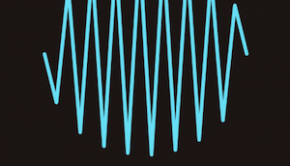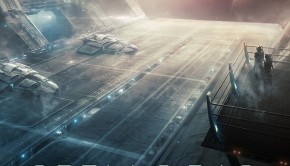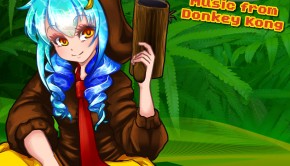Jeff Ball Interview: Composer and Violinist Alike
Jeff Ball has made quite an impact on game music in a short time. The classically-trained violinist and violist has performed on soundtracks as diverse as Mass Effect 3 and Red Orchestra 2. As a composer and arranger, he has produced delightful scores to projects spanning Tiny Barbarian, Monkey Island 2 Special Edition, and Globulous. The Alaskan-born artist is now making his mark on Los Angeles, collaborating with musicians such as Sam Hulick and Andrew Aversa, between handling his own solo projects.
Marking the site’s first interview in 2013, Jeff Ball discusses the paths that led him to where he is today. He goes into considerably detail about his projects — as a performer and composer alike — reflecting how he has developed considerable versatility over the years. The artist places special focus on the important of collaborating, noting how he has gone on to make lifelong friends and professional partnerships through his casual interactions at the Game Developers Conference. Jeff’s soundtracks are available to download through Bandcamp.
Interview Credits
Interview Subject: Jeff Ball
Interviewer: Chris Greening
Editor: Chris Greening
Coordination: Chris Greening
Interview Content
Chris: Jeff Ball, it’s a pleasure to interview you. You recently made the big move from the countryside of eastern Washington to the bustle of Los Angeles. Is it safe to say it’s a big change? How are you adapting to the new life?
Jeff Ball: Thanks, I appreciate the opportunity! It’s definitely been a big change coming down here. I did live in Seattle for a year after I graduated from college, so that helped prepare me for the traffic at least. The people though are very different than up north. But luckily I have a number of connections from the Game Developers Conference to keep me busy socializing, in addition to going out and meeting other various new people. When I moved here, I was surprised to find that I actually had a lot of friends down here, so it worked out.

Chris: Before we move on to your composing works, let’s talk about “Jeff Ball: The Performer”. You are classically-trained viola and violin player who graduated a few years ago from Central Washington University. Can you describe how you came to embrace these instruments? Are there any composers and performers that particularly inspire you as an instrumentalist?
Jeff Ball: At first, I had actually started out on piano at age four. My mom thought I would give up on it after a few weeks, but I actually stuck with it. When I was in school four years later, I had a classmate who had a violin and she showed it to me one day. I was fascinated by it — the wood, the intricate detail, and even the smell of the varnish grabbed me. I went home and told my mom that I wanted to play the violin. After that I took lessons on two instruments, I definitely favored the piano at first because violin is much harder to master, but when I was in high school, I fell in love with playing in orchestras. This was also when I started on viola — since our school was small, the director would have violinists switch out to play viola on certain pieces.
Eventually I auditioned for the local symphony and performed with them and other north-west symphonies for many years. In college, I switched to studying violin primarily, because I decided that violin would be more useful down the line, and I really clicked with the violin professors Carrie Rehkopf and Heather Netz. They really helped me push my boundaries and unlock my full potential. I could list many names of famous violinists I’ve been inspired by, but they’ll always be secondary to the people who believed in me and taught me the instrument.
Chris: As a violinist, you have been featured in titles such as Mass Effect 3, Gears of War 3, Infinity Blade II, and League of Legends. As a result, you’ve been described as the ‘most heard string player in the video game industry’, featuring in everything from epic cinematics to risqué scenes. How have you become involved in so many productions? What have been the biggest highlights for you?
Jeff Ball: Probably the biggest reason I’ve been involved in so many projects is because I’ve been going to the Game Developers Conference religiously for the last five years. If you live in the middle of nowhere and you want to network with game industry professionals, that’s your best option. I did some research on networking before I went my first year, and I decided to try an experiment. I decided to not talk about video game music, or my work, unless someone asked about it. In the end, after one week, I made a ton of life-long friends. When they saw that I was actually an accomplished musician/composer, that just ended up being an awesome bonus.
I think for me the highlights that I have are not so much working on such amazing projects, but working with the composers who are amazing people in their own right. When the game is released, it’s sort of like sending the great collaboration off to college after they’ve grown up. However, I do enjoy being able to tell people that, when you have sex in Mass Effect 3, you hear 8 layers of me on top of myself!
Chris: I want to draw particular attention to your performance in Red Orchestra 2: Heroes of Stalingrad. This game features an emotionally-charged, authentic classical score from Sam Hulick, but lacked the budget for a full orchestral performance. How did you support Hulick’s vision while performing for this score? Is it correct that your role gradually expanded due to the success of the recording sessions?
Jeff Ball: It was great working with Sam on Red Orchestra 2. Because the game is meant to be historically accurate depiction of the Germans and Russians during World War II, the developers definitely wanted an authentic, sombre, almost documentary-like sound. When it came to the music, Sam was tasked with writing in two different classical styles. From my perspective it worked out great. I’ve played many German and Russian pieces, so I understand the different nuances of each style in terms of violin performance. The recordings were very successful, and it was great to add a live instrument over the sample libraries. It can make a world of difference just to have one live instrument, and the developers recognized that as well. Once I had done a few tracks for Sam, he adapted many other tracks to allow for more violin solos at the request of the developers.

Chris: Many of your collaborations have developed with talented emerging artists, for example the aforementioned Sam Hulick, as well as Andrew Aversa and Whittaker Blackall. How have these come to develop over the years?
Jeff Ball: I think a lot of it has to do with the fact that most game composers, to some extent, keep in contact with each other. Facebook, IRC, Twitter, whatever, we talk to each other. Music is a communication, and as such, I think musicians inherently enjoy communicating and having a shared common ground, because not many other people share it. Playing in symphonies also has a very similar congenial quality, just with a different group of people. Even if you’re playing a solo piece, there’s usually a piano accompanist to musically communicate with, so the translation is very smooth between that and session recording for video games. The only real difference that I’m my own recording engineer, which I really enjoy as well.
These collaborations developed mostly because of shared need and availability. We keep in touch, and when someone needs help, the other is usually willing. If they become too busy, they might ask you for help. Everyone can be kind of busy, so working together can be a great excuse to have some shared experiences and stay connected.
Chris: Moving to “Jeff Ball: The Composer”, your first game score was the abandoned Dungeon Siegemod project Circle of Elders, which you recently released on Bandcamp. What did this project teach you about the principles of game composition?
Jeff Ball: I think what I learned from this project was less about composition, and more about failure. I remember being in high school and incredibly inspired by everything. I wanted to be the very best, like no one ever was. I wrote all of these tracks even before the game had much more than a story outline, a little bit of concept art, and a half-finished first level. I loved the sense of collaboration, and I learned how to work with the developers, who were excited as well. They helped tailor the tracks to what had been done so far game-wise. It was such a thrill to be part of a game project that I didn’t consider the reality that making games was a long process, and people get burned out and busy doing other things over time.
Later, I became acquainted with the reality of game programmers and artists having a more solid place in the industry, as the people who worked on that project eventually went on to work at PopCap and Riot Games, and how music is usually sidelined as a last minute addition that gets contracted out to people who work from home, unless you got lucky. To be completely honest, in some ways I think I’m still recovering from that.
Chris: How did you specifically portray the post-apocalyptic world featured in this title?
Jeff Ball: In terms of portraying the post-apocalyptic landscape in this game. I used acoustic mallet instruments, hand drums, and silence. I wanted the silence to be a musical attribute that fed the player a sense of empiness, and space. Dungeon Siege itself was a lonely game. Even though you would get team members with you, you would run for hours without encountering anything but monsters. I wanted to embed that sense into Circle of Elders as well. The game was very tribal, and the mallet instruments were almost meant to be used as period instruments. In my compositional brain, the sound of an instrument itself has always been a means of creating an environment, and the notes they play set the tone for how that environment/character/player should feel. If I would have used something like a String Quartet, the environment would have sounded more like Arcanum, which was steampunk.

Chris: Astroman is a score that reflects your versatility, featuring both orchestral and electronic interpretations of the same theme. How do you compose and implement music in both styles? Was this score a landmark in this regard or were you already well-versed in such compositional approaches?
Jeff Ball: Astroman was special to me. It was the first game I had ever done all of the in-game audio for, including music and sound effects. It was also a project where I essentially had free reign to do whatever I wanted musically. The only request the developers had was that the music should have strong melodies, and no chiptunes.
What ended up happening was interesting, because the game itself has a very retro feel. The music came out like chiptunes reversed. Very NES inspired melodic/harmonic content using modern synthesizers and samples, and instrumentally I contrasted acoustic and synthesized instruments to represent the human and alien life. Once those concepts were solidified, many of the tracks wrote themselves. It allowed me a freedom to implement a number of alien-like synthesized effects, which worked great to enhance the environments. The final battle has a fast-paced drum n’ bass electronic sound to represent the alien attack, while the credits theme is a full symphony orchestra to represent Astroman’s victory.
Chris: You’ve also tackled the music for several established franchises with Monkey Island 2: Special Edition in a supporting role and Wing Commander Saga as the lead composer. Could you share how you approached such projects? Were you a fan of the original games and was it important that you stayed faithful to them?
Jeff Ball: I actually was the only music arranger on the team for Monkey Island 2: Special Edition who had played the original game back in the day. It’s a game that I’m very fond of, and I had more than a few fan-boy geek-out moments while working on it. We ended up reworking the original MIDI files to streaming CD quality audio with live performances. I think, because I had played the original game, I wanted to stay more faithful to the original score. I even took the time to record the Scabb Island theme on recorder flutes, even though the tempo is very fluid to the point where I think the original track was just improvised.
The big challenge was the MIDI files themselves. They were written specifically for the iMuse engine, which was developed as an interactive midi file player at LucasArts. This was the first game they were testing it out on, and they were very ambitious with the interactivity. One MIDI file could contain as many as three or four different areas of the game, all with tons of transitions, not to mention that none of the instrument tracks had labels. We ended up having to go to YouTube to watch play-through videos of the original game just so we could remotely identify the synthesized instruments, let alone try to figure out where all the transitions went.
As far as Wing Commander Saga goes, I had not originally played the Wing Commander games growing up, but I found a love for them over the three years that I worked on that project. Because this was a fan project, the music was more of an imitation of George Oldziey than anything else. I have the somewhat unique ability to analyze and imitate composers without too much effort. The only problem was that I had very little creative freedom within the small box that is Oldziey’s Wing Commander soundtracks. I think the developers were more concerned about accurately portraying the original sound in this case than I was, and I ended up having to do many iterations of certain tracks just to pinpoint the exact musical qualities they were looking for. In the end I wished I could have done more for them, but because of the specific nature of the project, they definitely wanted fewer things that were very accurate, rather than many things that weren’t as accurate to the universe.

Chris: During the course of your career, you have performed with symphony orchestras and submitted major works to your faculty. Do you still intend to pursue a career as a classical musician, or is your attention more focused on soundtracks nowadays? While both areas are notoriously demanding, which do you find more rewarding to work in?
Jeff Ball: I love playing in symphonies, but honestly, right now things are tough for symphony organizations around the United States. Administrations are hiring businessmen that are trying to find the bottom line for their employees, except in the case of a symphony organization, the employees are the product, and the administrations are forgetting that. I could be working very hard and practicing for 10-12 hours a day to be at the level of a top tier symphony musician, but the hours become a drain on your soul, and it ends up not being fun anymore. The smaller groups are much better, but they don’t pay as much. I think ideally I’ll keep on with local small symphonies as a nice reason to get out of the apartment. I haven’t quite settled in to Los Angeles yet, but I might do that in the coming year as I get more comfortable. We’ll see. Right now I’m happy just developing a career doing soundtracks for games, and doing recording work.
Chris: On the topic of alternative career choices, few might be aware that you also work as a commercial fisherman every year. What’s that all about? Is it safe to say that your roots through Alaska and your family remain very important to you?
Jeff Ball: Back in the day, my great grandmother was married to a logger in Aberdeen, Washington, and she actually fled from him with five children and headed up to Alaska to meet family who had moved there earlier. She figured he wouldn’t find her up there, and it was also during the great depression. People actually found work up in Alaska, and my family just ended up staying. On my mom’s side, her father ended up being the principal of a mission school back in the 50s, and on my father’s side, they ran small airlines to fly passengers, hunters, supplies, mail, you name it. Both of my parents started commercial fishing when they were nine years old, and I started when I was nine as well. We now fish off the beach in Ekuk, Alaska using a process called setnetting. We catch mostly red salmon and sell it to a cannery that was built on the beach there.
Alaska will always be home to me, even if I don’t spend a lot of time there. I miss Kodiak a lot, and I think it comes out in my music. I’m drawn to thick textures and raw complexity that builds overarching massive musical movement, much like the landscape of Alaska.
Chris: Moving to your most recent projects, you recently co-composed the puzzler Globulous with Andrew Aversa. How did you blend a classic gaming sound with more contemporary approaches on this game? How did you get all the music sounding so fresh in terms of implementation?
Jeff Ball: I think it all boiled down to our inspirations for the project. Andrew and I talked about what soundtracks we liked and what the developers were thinking for the game before we started work on it. We wanted something like a mix between Machinarium, Bastion, and Secret of Mana, all while drawing from the 8-bit NES era as well. Using our common knowledge of soundtracks helped us blend styles, and we ended up experimenting by using techniques from each other to push ourselves into an even more cohesive sound. The end product was something that eventually morphed into what you hear, and I think both Andrew and I surprised ourselves with how well we worked together. You never know how it’s going to work out when you’re collaborating with someone until you actually do it, and this project just clicked for both of us.

Chris: One of your upcoming works is the Kickstarter-funded Tiny Barbarian DX. Will you continue to develop the 8-bit sound that you offered on the score for the original Tiny Barbarian? What else can we expect from you in the future?
Jeff Ball: I definitely want to stay within the 8-bit sound. I’ll probably push farther into the more developed 8-bit sound you’ve heard on soundtracks like Fez, but definitely stay within the realms of epic muscular adventure melodies and awesome heavy metal. There should be a lot of Tiny Barbarianhappening in the future, and I’m grateful for everyone who contributed to the Kickstarter for making that possible.
The future holds many things, most of which I probably don’t know about. The stuff I do know about though involves iOS games, disco violin, remixes, and perhaps some more Wing Commander. I also definitely have plans to develop and release my first non-soundtrack album.
Chris: Many thanks for your time today, Jeff Ball. Is there anything else you’d like to say about yourself or your works? Do you have any message to readers from across the world?
Jeff Ball: A lot people have looked at my work and will say things like “I could never do that.” My response to them is always “you could if you put the time into it.” If you spent 15 years trying to do one thing really really well, you would probably become really really good at it, and that’s all I’ve done. I don’t really think of myself as talented, just curious, and stubborn. I just started music young and the obsession I had made sure I wouldn’t quit. Allow yourself to become obsessed with something you love. Do that thing and enjoy it, then give back and teach other people how to do it. This is how we improve as humans.
Posted on January 1, 2013 by Chris Greening. Last modified on February 26, 2014.














